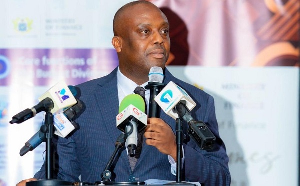Mr Sulemanu Koney, the Chief Executive Officer of the Ghana Chamber of Mines has called on business and financial journalists to support in ensuring sustainability, accountability and transparency in the governance of the country’s mineral resources.
He said there was the need for sustainability, accountability and transparency in the governance of the extractive industry and that it behoves on the financial and business journalist to do more in serving as critical watchdogs.
He was speaking at the fifth Flamingo Awards for financial and business journalists on the theme: “Towards Better Management of Natural Resources for Inclusive Growth and Development” organised by the Institute for Financial and Economic Journalists.
The awards seek to recognise business and financial journalists and editors who provide high quality coverage of the business and financial environment in Ghana.
Mr Koney said for the country to reap the benefits of its mineral deposits and maximise the gains of hosting the mineral resources, there must be prudent governance of the sector, adding that resources generated from the sector must be used meticulously.
He said accountability requires that "we demand from our leaders the right to know the way our resources are utilised and to make relevant input in making efficient utilisation proceeds from the country’s mineral resources."
He called for the enactment of a Mineral Revenue Management Law to complement the existing Mineral Development Fund Act 2016, Act 912 because the absence of a requisite legal framework on accountability in the management of mineral resources will continue to leave host communities in abject poverty.
Mr Koney said there was the need for an immediate constitution and inauguration of a Board for the Development Fund to ensure the realisation of the objectives of the Act 912.
He commended the winners of the awards and called on business journalist to hold leaders accountable always because they were the managers of the country’s natural mineral resources.
Mr Richard Annerquaye Abbey, an Editor at the Business and Financial Times was adjudged the 2018 Business and Financial Journalist of the Year for a well-researched and thought-provoking on pertinent issues of the economy.
Prior to winning ultimate award, he had won the Best in Tourism and Natural Resources category for the stories headlined “Hanging the Tourism Sector” and “Careless handling of Petroleum Funds worrying” respectively.
The 2018 IFEJ Flamingo Awards Business and Financial Journalist of the Year took home a plaque, citation, an LED flat screen television and would be sponsored by the Ghana National Petroleum Corporation to attend the World Bank Spring Meeting in April, next year.
Also picking awards at the night were Mr Kofi Ahovi, a Freelance Business Journalist, who won the Best in Agribusiness category and Mr Masahudu Ankilu of the Africa Eye Report, who also won the Best in Development category.
Mr Suleiman Mustapha, a Graphic Business Reporter also picked two separate awards in the Best in Finance and Local Economy categories.
Special awards were presented to some organisations and individuals for their roles played over the years in ensuring the success of the Institute and the celebration of financial journalists and editor.
Awards were presented to the Public Interest and Accountability Committee, the Business and Financial Times, Voltic Ghana Limited, Melcolm Ghana, GCB Bank Limited, and Ama Baafi of the Graphic Communications Group Limited.
Prof John Gatsi, the Chairman of the Awards Jury said 41 total entries were received for all nine categories but only seven categories qualified for awards because entries did not meet minimum requirement resulting in the out of rejection of two entries.
He urged potential entrants to ensure originality, creativity, and initiative as well as produce balanced, fair and the use multiple sources to deliver professional and quality reportage.
General News of Sunday, 16 December 2018
Source: ghananewsagency.org













